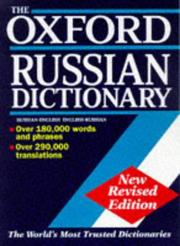Don't read cyrillic but want to mine the Russian web?
 Find a version of the word you can copy and paste, typically one of two ways:
Find a version of the word you can copy and paste, typically one of two ways:
- Find the term in English Wikipedia, and then use the "Languages" menu on the left to switch to the Russian entry for that term. This will have the benefit of being originally written in Russian rather than translated from English.
- Type the English into Google Translate and translate to Russian (be careful - translations far from perfect.)
Paste your terms into Google in the CHROME BROWSER, and then navigate through your results by clicking the "translate this page" links. (Again, be careful, these translations are far from perfect.)

Russian Dictionaries
-
 The Oxford Russian dictionary
Call Number: REF PG2640 .W5 and OnlineAvailability and more information from Catalyst...
The Oxford Russian dictionary
Call Number: REF PG2640 .W5 and OnlineAvailability and more information from Catalyst...
A word about searching
Accent Marks
Typically, search tools do better if you do NOT use the accent/diacritic marks that most romanizations add to the base alphabet letter.
For example: search "o" rather than "ó"
Romanization/Transliteration
There are plenty of times when you'll be searching for a Russian term using the English alphabet. Remember that the sounds of Russian words can be written in quite a number of different ways using the English alphabet, so string together alternate spellings using an uppercase "OR" between spellings.
For example: Tolstoy OR Tolstoi
Here is a a decent Romanization Table from Wikipedia that will help you think about how certain Cyrillic letters may have been written in U.S. sources, but for more historical transliteration schemes scroll up the article a bit.
Additionally, the Library of Congress Name Authority File will show you the "preferred" name as well as variants that you might try out in your search. Note: Not every Russian author or individual will be included in these records.
Truncation
If you're searching for a term that could have different endings for different parts of speech (which is most words in Russian), experiment with truncation by putting in the main part of the word followed by an asterisk. This will get you those first letters followed by any letter or letters. But BE CAREFUL: truncating to just a few letters will result in pretty unusable result lists.
For example: kartosk* instead of kartoski

